ATXN video of meeting — original link
Play video
Play video
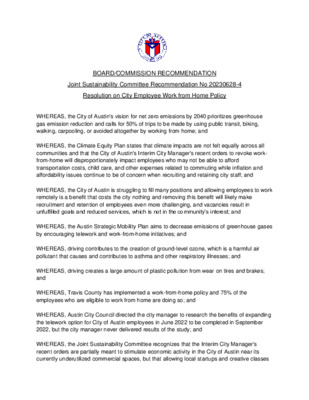
BOARD/COMMISSION RECOMMENDATION Joint Sustainability Committee Recommendation No 20230628-4 Resolution on City Employee Work from Home Policy WHEREAS, the City of Austin's vision for net zero emissions by 2040 prioritizes greenhouse gas emission reduction and calls for 50% of trips to be made by using public transit, biking, walking, carpooling, or avoided altogether by working from home; and WHEREAS, the Climate Equity Plan states that climate impacts are not felt equally across all communities and that the City of Austin's Interim City Manager's recent orders to revoke work- from-home will disproportionately impact employees who may not be able to afford transportation costs, child care, and other expenses related to commuting while inflation and affordability issues continue to be of concern when recruiting and retaining city staff; and WHEREAS, the City of Austin is struggling to fill many positions and allowing employees to work remotely is a benefit that costs the city nothing and removing this benefit will likely make recruitment and retention of employees even more challenging, and vacancies result in unfulfilled goals and reduced services, which is not in the community’s interest; and WHEREAS, the Austin Strategic Mobility Plan aims to decrease emissions of greenhouse gases by encouraging telework and work-from-home initiatives; and WHEREAS, driving contributes to the creation of ground-level ozone, which is a harmful air pollutant that causes and contributes to asthma and other respiratory illnesses; and WHEREAS, driving creates a large amount of plastic pollution from wear on tires and brakes; and WHEREAS, Travis County has implemented a work-from-home policy and 75% of the employees who are eligible to work from home are doing so; and WHEREAS, Austin City Council directed the city manager to research the benefits of expanding the telework option for City of Austin employees in June 2022 to be completed in September 2022, but the city manager never delivered results of the study; and WHEREAS, the Joint Sustainability Committee recognizes that the Interim City Manager's recent orders are partially meant to stimulate economic activity in the City of Austin near its currently underutilized commercial spaces, but that allowing local startups and creative classes to take advantage of the underutilized city office space as incubators and accelerators for their businesses may provide more long-term economic benefits to the City of Austin than having public workers and city staff drive into an office; NOW, THEREFORE, BE IT RESOLVED, the Joint Sustainability Committee recommends that the …
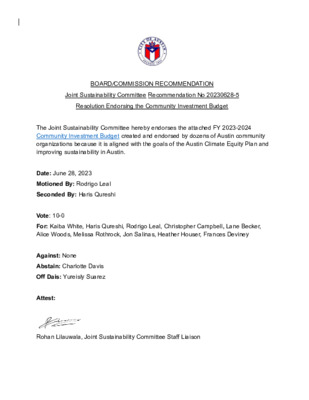
BOARD/COMMISSION RECOMMENDATION Joint Sustainability Committee Recommendation No 20230628-5 Resolution Endorsing the Community Investment Budget The Joint Sustainability Committee hereby endorses the attached FY 2023-2024 Community Investment Budget created and endorsed by dozens of Austin community organizations because it is aligned with the goals of the Austin Climate Equity Plan and improving sustainability in Austin. For: Kaiba White, Haris Qureshi, Rodrigo Leal, Christopher Campbell, Lane Becker, Alice Woods, Melissa Rothrock, Jon Salinas, Heather Houser, Frances Deviney Date: June 28, 2023 Motioned By: Rodrigo Leal Seconded By: Haris Qureshi Vote: 10-0 Against: None Abstain: Charlotte Davis Off Dais: Yureisly Suarez Attest: Rohan Lilauwala, Joint Sustainability Committee Staff Liaison Community Investment Budget The City’s budget is a reflection of our values. Those values should be reflected in a city budget created through an equitable, language-accessible and digitally-inclusive participatory budgeting process. The undersigned organizations jointly urge the following investments in community health, affordability, sustainability and safety for FY24 totaling $101.7 million or 7.8% of this year’s roughly $1.3 billion General Revenue budget. This request should be prioritized in the development of the City Manager’s Proposed Budget and as Council finalizes it. Austin’s budget is also a reflection of our city’s priorities. Austin should center its community needs in its budget, as articulated below. The undersigned groups ask that City management and elected officials prioritize the community issues listed below, which include but are not limited to, appropriate across the board pay increases for city staff to address inflation, park/youth/family programming, workforce development and services for those most in need. In recognition of the need for equitable resource support we ask that BIPOC led & served organizations be prioritized. ● Parent Support Specialists [$2.4M] ● Tenant Notification & Relocation Assistance Ordinance [$500,000] ● Emergency rental assistance, eviction defense, and tenant legal and support services [$16M] ● Inflation adjustment for city workers [$4M] ● Ebook Licensing Fees [$1M] ● Workforce Development [$5.9M] ● EMS Wage Increase [$14.7M] ● Domestic Abuse & Sexual Assault Victim services [$1.2M] ● Office of Violence Prevention [$500,000] ● Implementation of the Austin Climate Equity Plan [$685,000] ● Park Maintenance, Safety, Equity, and Restoration [$3.9M] ● Carver Library and Museum [$300,000] ● Tenant Education, Stabilization Support, and Community-based Agreement Support [$600,000] ● Displacement Prevention and Reentry Navigators [$1.5M] ● Estate and Probate Planning for Seniors [$300,000] ● Fair Housing Education, Support, and Testing [$500,000] ● Emergency Supplemental Assistance for Low Income Residents …
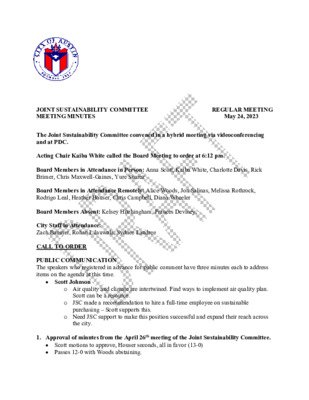
JOINT SUSTAINABILITY COMMITTEE REGULAR MEETING MEETING MINUTES May 24, 2023 The Joint Sustainability Committee convened in a hybrid meeting via videoconferencing and at PDC. Acting Chair Kaiba White called the Board Meeting to order at 6:12 pm. Board Members in Attendance in Person: Anna Scott, Kaiba White, Charlotte Davis, Rick Brimer, Chris Maxwell-Gaines, Yure Suarez Board Members in Attendance Remotely: Alice Woods, Jon Salinas, Melissa Rothrock, Rodrigo Leal, Heather Houser, Chris Campbell, Diana Wheeler Board Members Absent: Kelsey Hitchingham, Frances Deviney, City Staff in Attendance: Zach Baumer, Rohan Lilauwala, Sydnee Landree CALL TO ORDER PUBLIC COMMUNICATION The speakers who registered in advance for public comment have three minutes each to address items on the agenda at this time. Scott Johnson o Air quality and climate are intertwined. Find ways to implement air quality plan. Scott can be a resource. o JSC made a recommendation to hire a full-time employee on sustainable purchasing – Scott supports this. o Need JSC support to make this position successful and expand their reach across the city. 1. Approval of minutes from the April 26th meeting of the Joint Sustainability Committee. Scott motions to approve, Houser seconds, all in favor (13-0) Passes 12-0 with Woods abstaining. 2. JSC Officer Elections for the 2023-2024 Term (Discussion and/or Possible Action). Wheeler nominates White for Chair, Campbell seconds. White nominates Wheeler for Vice-Chair, Scott seconds. o Both pass unanimously (13-0) 3. Creation of JSC working groups to help advance implementation of the Austin Climate Equity Plan and updates from previously informal working groups (Discussion and/or Possible Action). Groups have been meeting informally, and are unofficial to date – Transportation, Buildings, Consumption + Natural Systems. Existing members been meeting unofficially, new members welcome. Goal – bring momentum to plan implementation, identify priorities and push them forward. Buildings – Salinas, Maxwell-Gaines White motions to formally create groups; Houser seconds o Passes unanimously (13-0) Updates from groups o Buildings – interest in moving forward building codes (2024 IECC, Passive House, etc.) some already happening with AEGB, how do we build on that work? o Consumption + Natural Systems – difficult to go through the plan and strategically rank actions. Consider implementation difficulty – will require outside outreach. Consumption section does not include as many policy changes, needs more money. Composting, green infrastructure, carbon neutrality for public lands – high impact + …
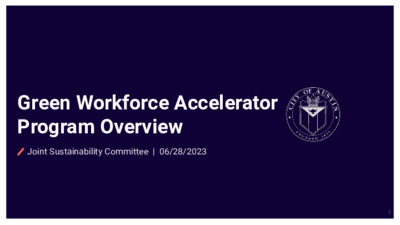
Green Workforce Accelerator Program Overview Joint Sustainability Committee | 06/28/2023 1 1 What and Why 2 Green Workforce Accelerator The GWA is a collaboration led by the Innovation Office between the Office of Sustainability, Office of Resilience, PARD, EDD, and ARR to expand the number and capacity of organizations providing good green jobs and green job training in Austin. ● The Climate Equity Plan has the overarching strategy of creating equitable access to good green jobs ● Several other departments and programs - e.g. Resilience, EDD, ARR, PARD - have initiatives that call for or support green jobs and equitable workforce development ● Historic IRA, BIL, and CHIPS and Science legislation is investing over $1T in clean energy and infrastructure, could create 12 million jobs - but no guarantee they will be good jobs that are accessible and provide career pathways to those who are most affected by climate change and have been locked out of economic prosperity. ● This program gives the City a vehicle to support community-based good green jobs and programs that help pursue our climate and equity goals. How we got here ● Fourth iteration of this program model for green jobs (others in 2019, 2021, 2022), seventh for all focus areas (affordability and homelessness, displacement mitigation 2019; homelessness 2023) ● Innovation Office developed the ACCC which included two community-based research studies to better understand what people want and need from green jobs programs, and an Austin green jobs economic analysis by UT. ● Number of partners providing training for and access to green jobs is low. Even less improving access for BIPOC, low income, LBGTQIA+, women, and other groups highly affected by climate impacts but with low access to green careers. ● City and its partners have and will grow significant power and influence for creating and supporting good green jobs based on the grants, direct payment tax credits, and infrastructure projects available through legislation. Now is the time to support and advance good partners. (Some of) the results from past programs ● ● ● ● ● Since 2019, 45 orgs enrolled/completed programs on affordability, homelessness, green jobs and climate change, workforce development, and anti displacement ● Created capacity for over 100 new jobs or job placements for residents 16 new programs or areas of service launched serving thousands of residents ● Majority of org participants go through major restructurings, growth, or formalizations or their …
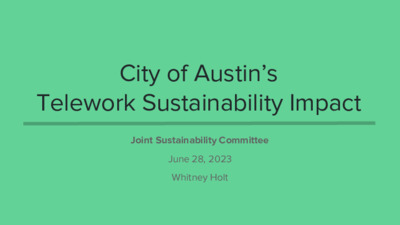
City of Austin’s Telework Sustainability Impact Joint Sustainability Committee June 28, 2023 Whitney Holt Pushing for a return to office rather than expanding telework demonstrates leadership that is out of touch with the needs of taxpayers and the workforce. A fully maximized telework policy is the only option that both saves taxpayers money and brings the City of Austin closer to our Climate Equity goals. A robust and fully maximized telework policy for City of Austin employees will move us closer to meeting the goals outlined the Austin Strategic Mobility Plan and Vision Zero.
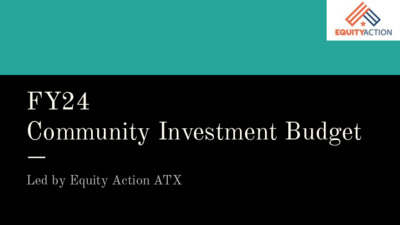
FY24 Community Investment Budget Led by Equity Action ATX Introductions Who is Equity Action? ● Equity Action is a Political Action Committee (PAC) focused on centering equity and justice in Austin’s political system. What is the Community Investment Budget? ● In collaboration with dozens of community organizations, Equity Action has been facilitating a 2024 Community Investment Budget that will ask Austin City Council to commit to invest directly to community needs, such as: increased wages for Parent Support Specialists, emergency rental assistance and tenant support services, social services for those experiencing homelessness, increased funding for park support, and much more. Who are the organizations involved? ACLU of Texas Alliance for Safety and Justice Austin Area Urban League Austin Community Law Center Austin Environmental Democrats Austin Justice Coalition Austin Mutual Aid Austin Urban Technology Movement Avow Blackland CDC Black Lives Veggies The Nonprofit Black Mamas ATX Community Resilience Trust Crime Survivors for Safety and Justice District 5 for Black Lives East Austin Conservancy Education Austin Equity Action Fruitful Commons Fund Texas Choice Go Austin/ Vamos Austin Ground Game Texas Hungry Hill Foundation Just Liberty Lilith Fund MISMA (Mujeres Inspiradas en Sueños, Metas y Acciones) Planning Our Communities Pro Choice with Heart Public Citizen Save Our Springs Alliance Sierra Club, Austin Regional Group Statewide Leadership Council Sunrise Movement Austin Survive2Thrive Foundation Sustainable Food Center Texas Center for Justice and Equity Texas Fair Defense Project Texas Harm Reduction Alliance Texas Women’s Justice Coalition The NICE Project Tomorrow’s Promise Foundation Undoing White Supremacy Austin University Democrats Zilker Neighborhood Association And the list continues to grow… Why is the CIB important? When Winter Storm Uri wreaked havoc across Austin, community members and organizations were the first to respond. Parent Support Specialists checked in on families to make sure they had what they needed to be safe, mutual aid and nonprofit organizations mobilized to rescue people from their homes (whether in a house or on the street), and local restaurants donated their time, food, and space to prepare and distribute meals. Our public libraries serve as community spaces, resource centers for unhoused and low-income people, and cultural hubs. EMS and City Workers are exploring opportunities in other cities due to salaries that have not kept pace with the increase cost of living in Austin. Lack of affordable, safe childcare is a barrier from employment and other opportunities to many families across the city. Why is the …
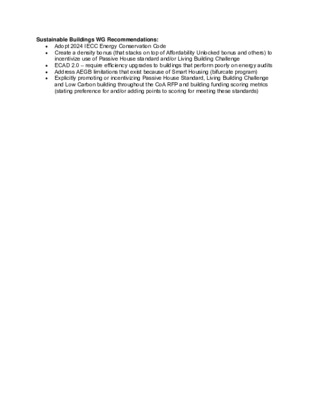
Sustainable Buildings WG Recommendations: • Adopt 2024 IECC Energy Conservation Code • Create a density bonus (that stacks on top of Affordability Unlocked bonus and others) to incentivize use of Passive House standard and/or Living Building Challenge • ECAD 2.0 – require efficiency upgrades to buildings that perform poorly on energy audits • Address AEGB limitations that exist because of Smart Housing (bifurcate program) • Explicitly promoting or incentivizing Passive House Standard, Living Building Challenge and Low Carbon building throughout the CoA RFP and building funding scoring metrics (stating preference for and/or adding points to scoring for meeting these standards)
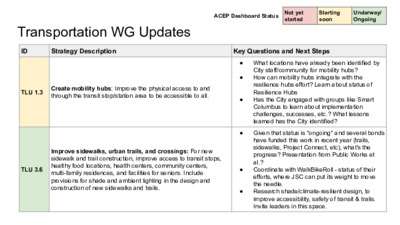
Transportation WG Updates ID Strategy Description Key Questions and Next Steps ACEP Dashboard Status Not yet started Starting soon Underway/ Ongoing TLU 1.3 Create mobility hubs: Improve the physical access to and through the transit stop/station area to be accessible to all. TLU 3.6 Improve sidewalks, urban trails, and crossings: For new sidewalk and trail construction, improve access to transit stops, healthy food locations, health centers, community centers, multi-family residences, and facilities for seniors. Include provisions for shade and ambient lighting in the design and construction of new sidewalks and trails. ● ● ● ● ● ● What locations have already been identified by City staff/community for mobility hubs? How can mobility hubs integrate with the resilience hubs effort? Learn about status of Resilience Hubs Has the City engaged with groups like Smart Columbus to learn about implementation challenges, successes, etc.? What lessons learned has the City identified? Given that status is "ongoing" and several bonds have funded this work in recent year (trails, sidewalks, Project Connect, etc), what's the progress? Presentation from Public Works et al.? Coordinate with WalkBikeRoll - status of their efforts, where JSC can put its weight to move the needle. Research shade/climate-resilient design, to improve accessibility, safety of transit & trails. Invite leaders in this space. ID Strategy Description Key Questions and Next Steps TE 1.1 Conduct an EV Community Needs Assessment: Work with local community partners, grassroots organizations, and connection points like the Austin Energy Customer Assistance Program and the City’s affordable housing programs. TE 1.2 Create equitable incentives for buying and leasing EVs: Collaborate with community partners to create inclusive and easily accessible incentives for buying or leasing electric vehicles. This strategy would supplement existing state and federal programs, prioritize low-income communities and communities of color and focus on geographic areas with limited or no access to transit. TE 1.4 Launch an e-bike and electric car-sharing program: Be intentional and equity-focused when considering where to install car sharing locations, what types of vehicles to include, and how to accept payment ● What are obstacles to this starting? ● At AE presentation, ask about EV charging infrastructure in Austin - where will it be located? In multifamily housing? How is equity factored into this? Possible rec: Allocate funding for staff/consultant to conduct the assessment. The ACEP Dashboard states that additional research is needed to identify possible funding sources for increased EV incentives. What is …
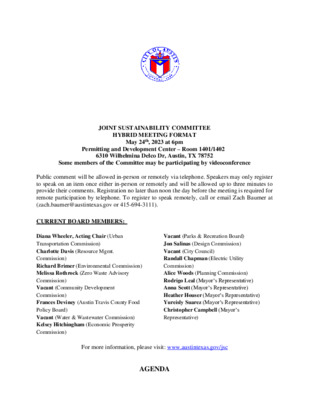
JOINT SUSTAINABILITY COMMITTEE HYBRID MEETING FORMAT May 24th, 2023 at 6pm Permitting and Development Center – Room 1401/1402 6310 Wilhelmina Delco Dr, Austin, TX 78752 Some members of the Committee may be participating by videoconference Public comment will be allowed in-person or remotely via telephone. Speakers may only register to speak on an item once either in-person or remotely and will be allowed up to three minutes to provide their comments. Registration no later than noon the day before the meeting is required for remote participation by telephone. To register to speak remotely, call or email Zach Baumer at (zach.baumer@austintexas.gov or 415-694-3111). CURRENT BOARD MEMBERS: Diana Wheeler, Acting Chair (Urban Transportation Commission) Charlotte Davis (Resource Mgmt. Commission) Richard Brimer (Environmental Commission) Melissa Rothrock (Zero Waste Advisory Commission) Vacant (Community Development Commission) Frances Deviney (Austin Travis County Food Policy Board) Vacant (Water & Wastewater Commission) Kelsey Hitchingham (Economic Prosperity Commission) Vacant (Parks & Recreation Board) Jon Salinas (Design Commission) Vacant (City Council) Randall Chapman (Electric Utility Commission) Alice Woods (Planning Commission) Rodrigo Leal (Mayor’s Representative) Anna Scott (Mayor’s Representative) Heather Houser (Mayor’s Representative) Yureisly Suarez (Mayor’s Representative) Christopher Campbell (Mayor’s Representative) For more information, please visit: www.austintexas.gov/jsc AGENDA CALL TO ORDER PUBLIC COMMUNICATION: GENERAL The first 10 speakers signed up prior to the meeting being called to order will each be allowed a three-minute allotment to address their concerns regarding items not posted on the agenda. DISCUSSION AND ACTION ITEMS 1. Approval of minutes from the April 26th meeting of the Joint Sustainability Committee. 2. JSC Officer Elections for the 2023-2024 Term (Discussion and/or Possible Action). 3. Creation of JSC working groups to help advance implementation of the Austin Climate Equity Plan and updates from previously informal working groups (Discussion and/or Possible Action). 4. Updates on the Inflation Reduction Act Coordinated Grant Approach – Rohan Lilauwala, Office of Sustainability (Discussion and/or Possible Action). 5. Climate Ambassadors Overview, Projects, and Lessons Learned – Sydnee Landry, Office of Sustainability (Discussion and/or Possible Action). 6. City of Austin Support for Energy Innovation and the Fossil Fuel Non-Proliferation Treaty (Discussion and/or Possible Action). FUTURE AGENDA ITEMS ADJOURNMENT The City of Austin is committed to compliance with the American with Disabilities Act. Reasonable modifications and equal access to communications will be provided upon request. Meeting locations are planned with wheelchair access. If requiring Sign Language Interpreters or alternative formats, please give notice at least 2 days …
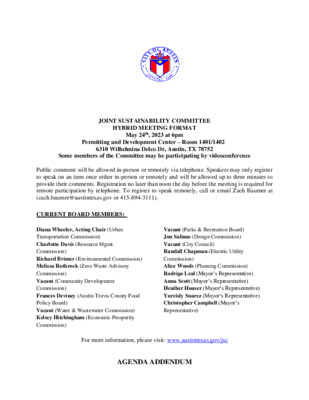
JOINT SUSTAINABILITY COMMITTEE HYBRID MEETING FORMAT May 24th, 2023 at 6pm Permitting and Development Center – Room 1401/1402 6310 Wilhelmina Delco Dr, Austin, TX 78752 Some members of the Committee may be participating by videoconference Public comment will be allowed in-person or remotely via telephone. Speakers may only register to speak on an item once either in-person or remotely and will be allowed up to three minutes to provide their comments. Registration no later than noon the day before the meeting is required for remote participation by telephone. To register to speak remotely, call or email Zach Baumer at (zach.baumer@austintexas.gov or 415-694-3111). CURRENT BOARD MEMBERS: Diana Wheeler, Acting Chair (Urban Transportation Commission) Charlotte Davis (Resource Mgmt. Commission) Richard Brimer (Environmental Commission) Melissa Rothrock (Zero Waste Advisory Commission) Vacant (Community Development Commission) Frances Deviney (Austin Travis County Food Policy Board) Vacant (Water & Wastewater Commission) Kelsey Hitchingham (Economic Prosperity Commission) Vacant (Parks & Recreation Board) Jon Salinas (Design Commission) Vacant (City Council) Randall Chapman (Electric Utility Commission) Alice Woods (Planning Commission) Rodrigo Leal (Mayor’s Representative) Anna Scott (Mayor’s Representative) Heather Houser (Mayor’s Representative) Yureisly Suarez (Mayor’s Representative) Christopher Campbell (Mayor’s Representative) For more information, please visit: www.austintexas.gov/jsc AGENDA ADDENDUM 7. Promotion of cooperation between the Airport and Environmental Commissions and the Department of Aviation on environmental matters that extend outside the boundaries of the ABIA property (Discussion and/or Possible Action).
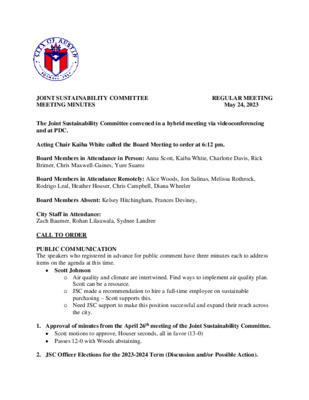
JOINT SUSTAINABILITY COMMITTEE REGULAR MEETING MEETING MINUTES May 24, 2023 The Joint Sustainability Committee convened in a hybrid meeting via videoconferencing and at PDC. Acting Chair Kaiba White called the Board Meeting to order at 6:12 pm. Board Members in Attendance in Person: Anna Scott, Kaiba White, Charlotte Davis, Rick Brimer, Chris Maxwell-Gaines, Yure Suarez Board Members in Attendance Remotely: Alice Woods, Jon Salinas, Melissa Rothrock, Rodrigo Leal, Heather Houser, Chris Campbell, Diana Wheeler Board Members Absent: Kelsey Hitchingham, Frances Deviney, City Staff in Attendance: Zach Baumer, Rohan Lilauwala, Sydnee Landree CALL TO ORDER PUBLIC COMMUNICATION The speakers who registered in advance for public comment have three minutes each to address items on the agenda at this time. • Scott Johnson o Air quality and climate are intertwined. Find ways to implement air quality plan. o JSC made a recommendation to hire a full-time employee on sustainable Scott can be a resource. purchasing – Scott supports this. o Need JSC support to make this position successful and expand their reach across the city. 1. Approval of minutes from the April 26th meeting of the Joint Sustainability Committee. • Scott motions to approve, Houser seconds, all in favor (13-0) • Passes 12-0 with Woods abstaining. 2. JSC Officer Elections for the 2023-2024 Term (Discussion and/or Possible Action). • Wheeler nominates White for Chair, Campbell seconds. • White nominates Wheeler for Vice-Chair, Scott seconds. o Both pass unanimously (13-0) 3. Creation of JSC working groups to help advance implementation of the Austin Climate Equity Plan and updates from previously informal working groups (Discussion and/or Possible Action). • Groups have been meeting informally, and are unofficial to date – Transportation, Buildings, Consumption + Natural Systems. Existing members been meeting unofficially, new members welcome. • Goal – bring momentum to plan implementation, identify priorities and push them forward. • Buildings – Salinas, Maxwell-Gaines • White motions to formally create groups; Houser seconds o Passes unanimously (13-0) • Updates from groups o Buildings – interest in moving forward building codes (2024 IECC, Passive House, etc.) some already happening with AEGB, how do we build on that work? o Consumption + Natural Systems – difficult to go through the plan and strategically rank actions. Consider implementation difficulty – will require outside outreach. Consumption section does not include as many policy changes, needs more money. Composting, green infrastructure, carbon neutrality for public lands – high impact + …
Play audio
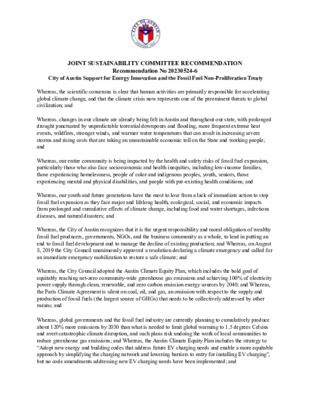
JOINT SUSTAINABILITY COMMITTEE RECOMMENDATION Recommendation No 20230524-6 City of Austin Support for Energy Innovation and the Fossil Fuel Non-Proliferation Treaty Whereas, the scientific consensus is clear that human activities are primarily responsible for accelerating global climate change, and that the climate crisis now represents one of the preeminent threats to global civilization; and Whereas, changes in our climate are already being felt in Austin and throughout our state, with prolonged drought punctuated by unpredictable torrential downpours and flooding, more frequent extreme heat events, wildfires, stronger winds, and warmer water temperatures that can result in increasing severe storms and rising costs that are taking an unsustainable economic toll on the State and working people; and Whereas, our entire community is being impacted by the health and safety risks of fossil fuel expansion, particularly those who also face socioeconomic and health inequities, including low-income families, those experiencing homelessness, people of color and indigenous peoples, youth, seniors, those experiencing mental and physical disabilities, and people with pre-existing health conditions; and Whereas, our youth and future generations have the most to lose from a lack of immediate action to stop fossil fuel expansion as they face major and lifelong health, ecological, social, and economic impacts from prolonged and cumulative effects of climate change, including food and water shortages, infectious diseases, and natural disasters; and Whereas, the City of Austin recognizes that it is the urgent responsibility and moral obligation of wealthy fossil fuel producers, governments, NGOs, and the business community as a whole, to lead in putting an end to fossil fuel development and to manage the decline of existing production; and Whereas, on August 8, 2019 the City Council unanimously approved a resolution declaring a climate emergency and called for an immediate emergency mobilization to restore a safe climate; and Whereas, the City Council adopted the Austin Climate Equity Plan, which includes the bold goal of equitably reaching net-zero community-wide greenhouse gas emissions and achieving 100% of electricity power supply through clean, renewable, and zero carbon emission energy sources by 2040; and Whereas, the Paris Climate Agreement is silent on coal, oil, and gas, an omission with respect to the supply and production of fossil fuels (the largest source of GHGs) that needs to be collectively addressed by other means; and Whereas, global governments and the fossil fuel industry are currently planning to cumulatively produce about 120% more emissions by 2030 than what …
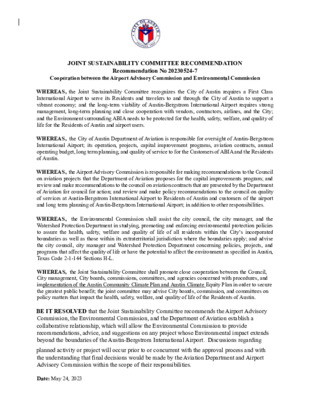
JOINT SUSTAINABILITY COMMITTEE RECOMMENDATION Recommendation No 20230524-7 Cooperation between the Airport Advisory Commission and Environmental Commission WHEREAS, the Joint Sustainability Committee recognizes the City of Austin requires a First Class International Airport to serve its Residents and travelers to and through the City of Austin to support a vibrant economy; and the long-term viability of Austin-Bergstrom International Airport requires strong management, long-term planning and close cooperation with vendors, contractors, airlines, and the City; and the Environment surrounding ABIA needs to be protected for the health, safety, welfare, and quality of life for the Residents of Austin and airport users. WHEREAS, the City of Austin Department of Aviation is responsible for oversight of Austin-Bergstrom International Airport; its operation, projects, capital improvement programs, aviation contracts, annual operating budget, long term planning, and quality of service to for the Customers of ABIA and the Residents of Austin. WHEREAS, the Airport Advisory Commission is responsible for making recommendations to the Council on aviation projects that the Department of Aviation proposes for the capital improvements program; and review and make recommendations to the council on aviation contracts that are presented by the Department of Aviation for council for action; and review and make policy recommendations to the council on quality of services at Austin-Bergstrom International Airport to Residents of Austin and customers of the airport and long term planning of Austin-Bergstrom International Airport; in addition to other responsibilities. WHEREAS, the Environmental Commission shall assist the city council, the city manager, and the Watershed Protection Department in studying, promoting and enforcing environmental protection policies to assure the health, safety, welfare and quality of life of all residents within the City’s incorporated boundaries as well as those within its extraterritorial jurisdiction where the boundaries apply; and advise the city council, city manager and Watershed Protection Department concerning policies, projects, and programs that affect the quality of life or have the potential to affect the environment as specified in Austin, Texas Code 2-1-144 Sections H-L. WHEREAS, the Joint Sustainability Committee shall promote close cooperation between the Council, City management, City boards, commissions, committees, and agencies concerned with procedures, and implementation of the Austin Community Climate Plan and Austin Climate Equity Plan in order to secure the greatest public benefit; the joint committee may advise City boards, commission, and committees on policy matters that impact the health, safety, welfare, and quality of life of the Residents of Austin. BE …
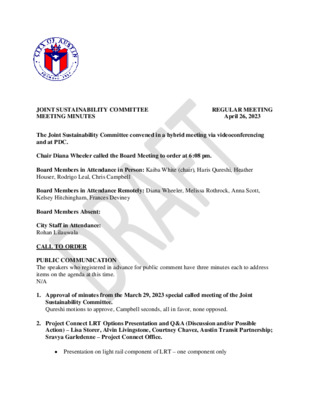
JOINT SUSTAINABILITY COMMITTEE REGULAR MEETING MEETING MINUTES April 26, 2023 The Joint Sustainability Committee convened in a hybrid meeting via videoconferencing and at PDC. Chair Diana Wheeler called the Board Meeting to order at 6:08 pm. Board Members in Attendance in Person: Kaiba White (chair), Haris Qureshi, Heather Houser, Rodrigo Leal, Chris Campbell Board Members in Attendance Remotely: Diana Wheeler, Melissa Rothrock, Anna Scott, Kelsey Hitchingham, Frances Deviney Board Members Absent: City Staff in Attendance: Rohan Lilauwala CALL TO ORDER PUBLIC COMMUNICATION The speakers who registered in advance for public comment have three minutes each to address items on the agenda at this time. N/A 1. Approval of minutes from the March 29, 2023 special called meeting of the Joint Sustainability Committee. Qureshi motions to approve, Campbell seconds, all in favor, none opposed. 2. Project Connect LRT Options Presentation and Q&A (Discussion and/or Possible Action) – Lisa Storer, Alvin Livingstone, Courtney Chavez, Austin Transit Partnership; Sravya Garledenne – Project Connect Office. • Presentation on light rail component of LRT – one component only • Cost estimates came up high, so initial system needs to be scaled back to fit funding envelope • Not seeking feedback on downtown crossings at the moment for surface alignments o White: What are pros and cons of crossings? o Livingstone: S1st pros-straight line crossing; cons-traffic at Cesar Chavez; Trinity street pros-connection to conv ctr, east downtown; cons-impacts boathouse, still traffic at Cesar Chavez • Houser: why does 38th/Oltorf/Yellow Jacket offer more flexibility vs North Lamar to Pleasant Valley o NL-PV requires protective buys (to preserve extension southward), and/or require a spur put in. 3-legged option has a transfer station • Intention is to build out full system once funding is available • Qureshi – elevated option avoids traffic from 8th to S Congress • Over 12,000-13,000 comments – does not include meetings (70+) • Qureshi – for partial underground – why not go down South rather than East? o Livingstone – money+technical feasibility; highest ridership segments were prioritized (UT, Republic Square, Pleasant Valley); each option also has to extend to a maintenance facility. o White: lots of student housing off Riverside • Qureshi – what’s the status of the capitol view corridor on South Congress? o Livingstone: LRV is no different than a bus; wires no different than existing infrastructure, crossing ramp descends to grade before South Congress • Qureshi – could an airport option …
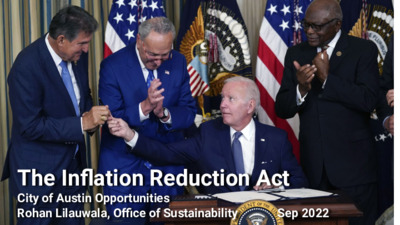
The Inflation Reduction Act City of Austin Opportunities Rohan Lilauwala, Office of Sustainability Sep 2022 About ● Largest investment in climate in US history ○ $391 billion ● Projected 40% reduction in GHGs by 2030 (from 2005 levels) ○ Further federal action + local/state action is needed to meet US goals (50-52% GHG reduction) as part of Paris Agreement ● Funding opportunities for City of Austin departments as well as community partners to work on climate action Breakdown of Funding in IRA Source: RMI GHG Reductions / Environmental Justice $5 b $2.8 b Climate Pollution Reduction Grants for local and state plans and implementation projects to reduce GHGs Environmental and Climate Justice Block Grants for community- led climate, resilience, pollution mitigation, capacity building projects Direct funding opportunity for City Projects Opportunity for City to support community-based organizations, help find resources and build capacity Direct Pay Tax Credits Tax-exempt entities like cities or municipally-owned utilities can claim a tax credit despite having no tax liability. ● Renewable Electricity Production ● Renewable Energy Investment ● Carbon Oxide Sequestration ● Zero-Emission Nuclear Power Production (new in Opportunities for AE to directly invest in renewable assets, EDD advanced manufacturing incentives, fleet savings, clean ARR trucks, PARD/WPD/AW/DSD carbon sequestration projects, etc. ● Clean Hydrogen Production Credit (new in IRA) ● Advanced Manufacturing Production (new in IRA) IRA/CHIPS) ● Clean Electricity Production (new in IRA) ● Clean Fuel Production (new in IRA) ● Clean Energy Investment (new in IRA) ● Qualifying Advanced Energy Project (new in IRA) ● Clean Electricity Investment (new in IRA) ● Alternative Fuel Refueling Property ● Qualified Commercial Clean Vehicles (new in IRA) Direct Pay Tax Credits Many tax credits have ‘adders’ or bonus credits awarded for many different purposes, which can be stacked to maximize benefits: ● If prevailing wage/apprenticeship requirements are met ● If projects are located in disadvantaged communities (additional bonus if benefits primarily flow to residents) ● For meeting domestic content requirements ● For projects in an ‘energy community’ Transportation $290 m Alternative Fuel and Low-Emission Aviation Technology Program $3.2 b Neighborhood Access and Equity Grant Program for highway removal, remediation, capping + complete streets, active transportation + access to essential destinations $600 m Clean Heavy-Duty Vehicles Grants and Rebates, to cover incremental costs of vehicles, fueling/charging infrastructure, workforce development, technical assistance Potential funding for clean ARR trucks, CapMetro buses, AISD buses Aviation department opportunity - cleaner jet …
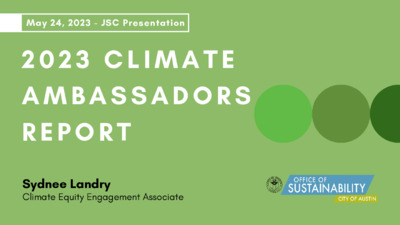
May 24, 2023 - JSC Presentation 2 0 2 3 C L I M A T E A M B A S S A D O R S R E P O R T Sydnee Landry Climate Equity Engagement Associate Background Information THE CLIMATE AMBASSADOR PROGRAM WAS CREATED AS A PAID OPPORTUNITY FOR PASSIONATE AUSTINITES TO ENGAGE THEIR COMMUNITIES AND GET INPUT FOR THE AUSTIN CLIMATE EQUITY PLAN IN 2020 Background Information OVER 6 MONTHS, THE 2020 AMBASSADORS COMPLETED 50+ INTERVIEW REPORTS FROM CONVERSATIONS THEY HAD WITH PEOPLE ABOUT SUSTAINABILITY, CLIMATE, AND THEIR VISIONS FOR AUSTIN MAJOR THEMES FROM THESE CONVERSATIONS WERE DISTILLED AND INCORPORATED INTO THE CLIMATE EQUITY PLAN AS EQUITY ICONS Example of equity icon use throughout the plan Equity icons IN 2021 THE PLAN WAS FORMALLY ADOPTED BY CITY COUNCIL, WHICH MEANT THE WORK OF IMPLEMENTATION COULD BEGIN... ... AND THE FOCUS OF THE CLIMATE AMBASSADOR GROUP WOULD NEED TO CHANGE A BIT WHICH IS WHERE I CAME IN! AND SET OUT TO GET STAKEHOLDER INPUT AS I REIMAGINED THE PROGRAM... The JSC, The JSC, Former Ambassadors, Former Ambassadors, ACEP Advisory Groups, ACEP Advisory Groups, Community orgs, Community orgs, and many more... and many more... Me 2 Me 2 months in months in to this job to this job community-led community-led strategies from strategies from the climate plan the climate plan opportunity to opportunity to reimagine reimagine engagement engagement for for implementation implementation opportunities opportunities to implement to implement climate plan climate plan 2022-2023 2022-2023 CLIMATE CLIMATE AMBASSADORS AMBASSADORS desire to desire to build build community community capacity capacity desire to avoid desire to avoid extractive extractive engagement engagement TRAINING & EDUCATION ONGOING PARTICIPATION WITH OOS STAFF INTERVIEW REPORTS TRAINING & EDUCATION WITH AN ADDITIONAL CIVIC ENGAGEMENT WORKSHOP RELATIONSHIP BUILDING MORE EMPHASIS ON THE CITY + AMBASSADOR RELATIONSHIP COMMUNITY ACTION PROJECTS THAT ARE AMBASSADOR DESIGNED AND LED WITH COMMUNITY BENEFIT IN MIND +1 civic +1 civic workshop workshop +1 relationship +1 relationship building building +1 community +1 community benefit benefit SINCE THIS NEW COMMUNITY ACTION PROJECT ELEMENT WAS BEING ADDED, WE WANTED TO MAKE SURE WE SELECTED AMBASSADORS THAT MET THE FOLLOWING CRITERIA... SHOWS A NUANCED UNDERSTANDING OF INEQUITIES REPRESENTS A MARGINALIZED COMMUNITY HAS EXPERIENCE WORKING, VOLUNTEERING, OR ORGANIZING WITH MARGINALIZED COMMUNITIES IN AUSTIN HAS A CONNECTION TO OR ESTABLISHED METHOD OF OUTREACH TO MARGINALIZED COMMUNITIES The 2022 Ambassadors K E C I A D Y L …
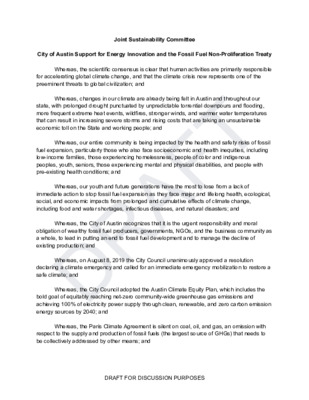
Joint Sustainability Committee City of Austin Support for Energy Innovation and the Fossil Fuel Non-Proliferation Treaty Whereas, the scientific consensus is clear that human activities are primarily responsible for accelerating global climate change, and that the climate crisis now represents one of the preeminent threats to global civilization; and Whereas, changes in our climate are already being felt in Austin and throughout our state, with prolonged drought punctuated by unpredictable torrential downpours and flooding, more frequent extreme heat events, wildfires, stronger winds, and warmer water temperatures that can result in increasing severe storms and rising costs that are taking an unsustainable economic toll on the State and working people; and Whereas, our entire community is being impacted by the health and safety risks of fossil fuel expansion, particularly those who also face socioeconomic and health inequities, including low-income families, those experiencing homelessness, people of color and indigenous peoples, youth, seniors, those experiencing mental and physical disabilities, and people with pre-existing health conditions; and Whereas, our youth and future generations have the most to lose from a lack of immediate action to stop fossil fuel expansion as they face major and lifelong health, ecological, social, and economic impacts from prolonged and cumulative effects of climate change, including food and water shortages, infectious diseases, and natural disasters; and D R A F T Whereas, on August 8, 2019 the City Council unanimously approved a resolution declaring a climate emergency and called for an immediate emergency mobilization to restore a safe climate; and Whereas, the City Council adopted the Austin Climate Equity Plan, which includes the bold goal of equitably reaching net-zero community-wide greenhouse gas emissions and achieving 100% of electricity power supply through clean, renewable, and zero carbon emission energy sources by 2040; and Whereas, the City of Austin recognizes that it is the urgent responsibility and moral obligation of wealthy fossil fuel producers, governments, NGOs, and the business community as a whole, to lead in putting an end to fossil fuel development and to manage the decline of existing production; and Whereas, the Paris Climate Agreement is silent on coal, oil, and gas, an omission with respect to the supply and production of fossil fuels (the largest source of GHGs) that needs to be collectively addressed by other means; and DRAFT FOR DISCUSSION PURPOSES Whereas, global governments and the fossil fuel industry are currently planning to cumulatively produce about 120% more …
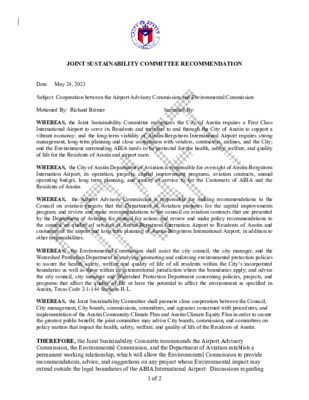
JOINT SUSTAINABILITY COMMITTEE RECOMMENDATION Seconded By: Date: May 24, 2023 Subject: Cooperation between the Airport Advisory Commission and Environmental Commission Motioned By: Richard Brimer WHEREAS, the Joint Sustainability Committee recognizes the City of Austin requires a First Class International Airport to serve its Residents and travelers to and through the City of Austin to support a vibrant economy; and the long-term viability of Austin-Bergstrom International Airport requires strong management, long-term planning and close cooperation with vendors, contractors, airlines, and the City; and the Environment surrounding ABIA needs to be protected for the health, safety, welfare, and quality of life for the Residents of Austin and airport users. WHEREAS, the City of Austin Department of Aviation is responsible for oversight of Austin-Bergstrom Internation Airport; its operation, projects, capital improvement programs, aviation contracts, annual operating budget, long term planning, and quality of service to for the Customers of ABIA and the Residents of Austin. WHEREAS, the Airport Advisory Commission is responsible for making recommendations to the Council on aviation projects that the Department of Aviation proposes for the capital improvements program; and review and make recommendations to the council on aviation contracts that are presented by the Department of Aviation for council for action; and review and make policy recommendations to the council on quality of services at Austin-Bergstrom Internation Airport to Residents of Austin and customers of the airport and long term planning of Austin-Bergstrom International Airport; in addition to other responsibilities. WHEREAS, the Environmental Commission shall assist the city council, the city manager, and the Watershed Protection Department in studying, promoting and enforcing environmental protection policies to assure the health, safety, welfare and quality of life of all residents within the City’s incorporated boundaries as well as those within its extraterritorial jurisdiction where the boundaries apply; and advise the city council, city manager and Watershed Protection Department concerning policies, projects, and programs that affect the quality of life or have the potential to affect the environment as specified in Austin, Texas Code 2-1-144 Sections H-L. WHEREAS, the Joint Sustainability Committee shall promote close cooperation between the Council, City management, City boards, commissions, committees, and agencies concerned with procedures, and implementation of the Austin Community Climate Plan and Austin Climate Equity Plan in order to secure the greatest public benefit; the joint committee may advise City boards, commission, and committees on policy matters that impact the health, safety, welfare, and quality …